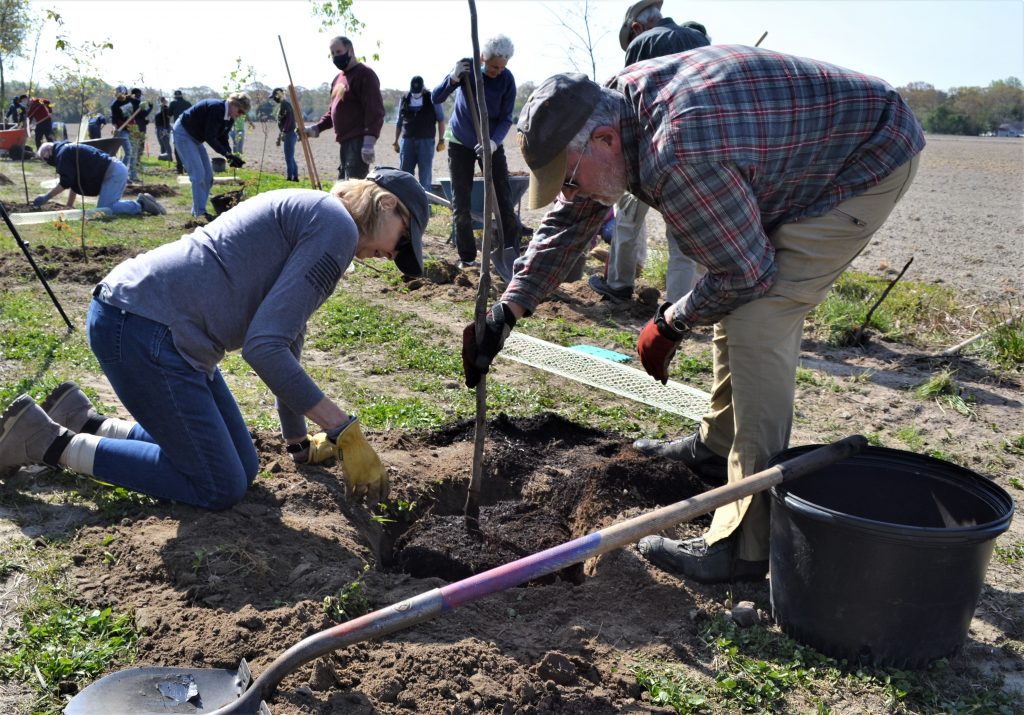Sunday hunting is prohibited on all State Forest property More Info
Trees provide numerous benefits to a community. Through proper planning, design, and management, trees can improve human health and well-being by moderating climate, decreasing energy use, improving air quality, providing natural beauty and recreational opportunities, reducing flooding, and many other benefits.

Delaware’s Urban and Community Forestry Program offers annual grants of up to $5,000 for tree planting or tree management projects on public land. The competitive grants – open to all municipalities, homeowner associations, and certified 501(c)(3) non-profits in the State of Delaware – require a 50-50 match in either cash (non-federal funds) or in-kind services, which includes volunteer or staff time, equipment rental, or supplies. Requests can range from a minimum of $500 to a maximum of $5,000 in only one of two project categories: tree planting or tree management (i.e., professional tree inventory, hazardous tree removal, or pruning). Applicants are also required to schedule a site visit to review their project. Site visits must be scheduled at least one week in advance.
Learn more about Grant and Funding Opportunities
Forests in a Dynamic World Webinar Series
USDA Urban and Community Forestry Program
Delaware’s Tree Stewards Program connects people to their landscapes by planting and caring for trees and forests, which are essential in protecting the lands and waters of the First State. By training and empowering citizens locally, the goal is to ensure Delaware has a greener future. Whether young or old, trees benefit from knowledge and care. Delaware Tree Stewards program is designed to help citizens take an active role in caring for trees, supporting local ecosystems and the communities that depend on them. Through training and networking, graduates will recognize opportunities and coordinate tree projects where they are needed most.
Delaware’s Urban and Community Forestry Program partners with the National Arbor Day Foundation on Tree City USA, Tree Campus, and Tree Line USA recognition programs. Delaware also offers a Tree Friendly Community Program, which honors homeowner associations, neighborhoods, and civic groups committed to conserving and enhancing their urban and community forests.
Learn more about Tree Recognition Programs
Integrated Pest Management (IPM) is a science-based decision-making process that combines tools and strategies to identify and manage pests. Pests are any organisms (including plants and animals) that pose health, environmental, economic, or aesthetic risks. IPM provides economic, health, and environmental benefits. IPM practitioners use knowledge of pest and host biology along with monitoring to implement management tactics to 1) prevent unacceptable levels of pest damage; 2) minimize the risk to people, property, infrastructure, natural resources, and the environment; and 3) reduce the evolution of pest resistance to pesticides and other pest management practices.
University of Maryland IPM Alerts – Landscape and Nursery
Delaware Invasive Species Council (DISC) is a non-regulatory organization comprised of nearly 100 scientists, botanists, and ecologists with government, academia, and non-profit organizations. Its mission is to protect Delaware’s ecosystems by preventing the introduction and reducing the impact of non-native species.
Delaware Native Species Commission was formed by the Delaware General Assembly to implement recommendations made in the final report of the Statewide Ecological Extinction Task Force. Its mission is to: 1) reverse the trend of decline and extinction of Delaware’s local plant and animal native species; 2) work to implement the recommendations of the Statewide Ecological Extinction Task Force; and 3) provide expertise and assistance to state and local lawmakers, policymakers, educators, and other stakeholders.
Delaware Department of Agriculture’s (DDA) Plant Industries Section aims to prevent the introduction, establishment, or spread of plant and honeybee pests, and suppress, control, abate, or eradicate pests that are dangerously injurious to the agricultural, horticultural, and forestry interests of the state.
Delaware Invasive Plants Law (Effective July 1, 2022)
Introduction to UTC Assessments VIDEO
EPA’s National Stormwater Calculator
Urban Forest Management Plan (UFMP) Toolkit
Urban Forestry Best Management Practices for Public Works Managers
Conducting a Tree Inventory (Cornell University)
Urban Tree Canopy Assessment (U.S. Forest Service)
Urban Nature for Health and Wellbeing (U.S. Forest Service)
Tree Equity Score (American Forests)
Ordinances – Overview (New York State)
Sample Tree Ordinance (Arbor Day Foundation)
Guide to Successful Pruning of Deciduous Trees – Calendar
Guide to Preserving Trees During Development (Penn State Extension) (PDF)
American Society of Consulting Arborists
International Society of Arboriculture (ISA)
Delaware Nursery and Landscape Association
Society of Municipal Arborists
Tree Care Industry Association
Virginia Tech Dendrology
Arbor Day Foundation Tree Identification
Cornell University Woody Plants Database
The Delaware Forest Service’s Urban and Community Forestry Program has compiled extensive maps that detail the tree canopy for each of Delaware’s 57 communities. Click on the links below to view and download the map for each community.
Delaware Interactive Tree Canopy Tool
If you have questions, comments, or need assistance, please contact:
Urban and Community Forestry Program Send E-mail.